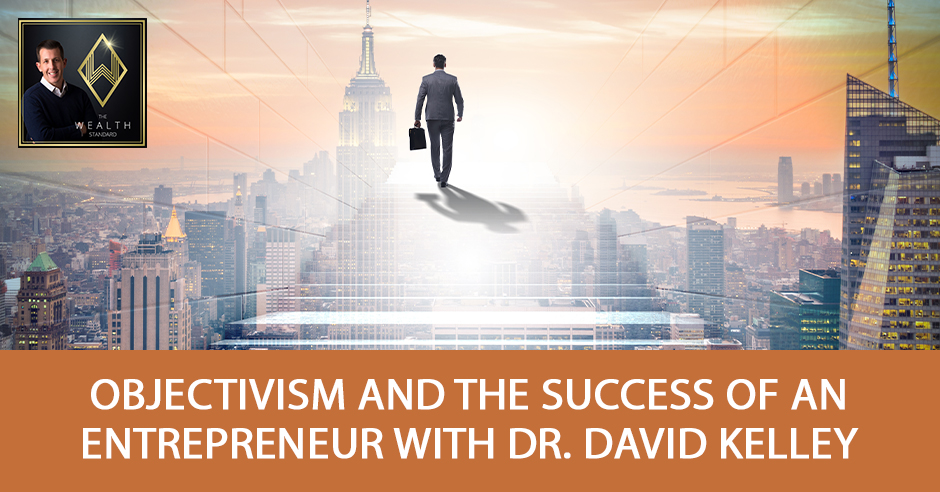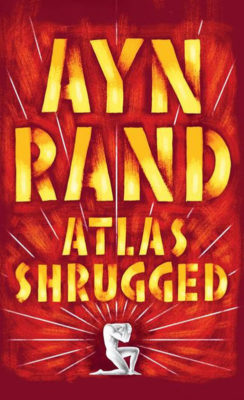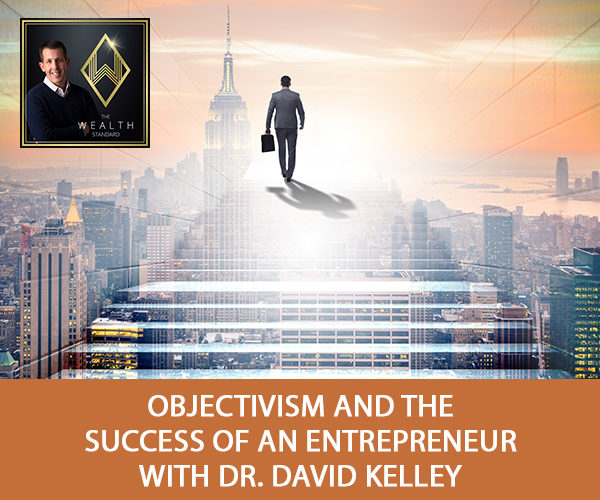Objectivism And The Success Of An Entrepreneur With Dr. David Kelley
Podcast: Play in new window | Download

Objectivism is the belief that certain things, especially moral truths, exist independently of human knowledge or perception of them. On today’s show, Dr. David Kelley describes the concept of objectivism and its four pillars, as well as the most common, refutes for these tenets. He also discusses the relevance of objectivism as it relates to the success of an entrepreneur. Dr. Kelley is a professional philosopher, teacher, and writer. He is also the Founder of The Atlas Society and the author of numerous works in philosophy, politics, and culture.
—
Listen to the podcast here:
Objectivism And The Success Of An Entrepreneur With Dr. David Kelley
We are still talking about entrepreneurship and I had an awesome opportunity to speak with Dr. David Kelley. He is the Founder of The Atlas Society that he founded in 1990. He’s been a huge advocate of objectivism and has written a number of books. He has a lot of accolades. The Atlas Society has a mountain of information on their website. I really liked the way he described the ideas of objectivism. What he sees the involvement of the Atlas Society in regards to younger entrepreneurs and seeing around the world, whether they describe their activities and their philosophy as objectivism or not still understand its basic tenets. That is causing this entrepreneurial type of drive toward improving someone’s life and improving the world in general. I understand that there are some things we talk about that are somewhat controversial depending on what your perspective is. I would encourage you to read the part where I talk about language. How important it is to use the right words and language to describe what the actual meaning is because these days, things are taken out of context and misconstrued and so forth.
Regardless, it was a great conversation. You guys are going to learn a lot. For those of you who have not read Atlas Shrugged yet, I think this is going to be one that inspires you to do so. Maybe for some who haven’t read it in a while, I inspire you to read it again. You guys are going to enjoy it. If you like what you read, go back and read to the previous episodes in this season. Also, get onto YouTube as well. We have all of our episodes and video. You would enjoy that if you’re visual learners. Thanks for all the support. You are amazing. If you have some time and you like what you’ve read, head over to iTunes and give us a good review. It definitely helps, especially as the way in which finding podcasts has been more difficult. High ratings definitely increase the amount of presence that we have and help us increase our audience and also share up with a friend too. We’ll talk to you next time with another amazing guest. His name is Mike Moyer and he wrote the book, Slicing Pie.
—
Dr. Kelley, it is such an honor to have you on the show. Thank you so much for taking your time.
It’s a pleasure to be here, Patrick. Thank you.
The first thing that I’m so impressed by is how much of your life and your energy has been focused around advancing the philosophy of objectivism with The Atlas Society and other groups. Would you be able to tell the audience what were the events and circumstances that led to your decision to make that dedication?
I read Ayn Rand in high school at a time when I was thinking about what I wanted to do with my life and what my values were as many people at that age do. It bowled me over that she had developed ideas that speak on to the roads that I began to explore. She had gone much further down those roads. However, what led me to read her in the first place was at what became clear as an emerging interest in philosophy as a branch of knowledge. That’s something I wanted to study. I went to college to study philosophy. You didn’t expect that I would remain as committed to objectivism theoretically as I was when I went to college. Every challenge that from other philosophers, from my professors, I see Ayn Rand had a good answer to. I never saw a reason to change. The reason I stayed with it, my interest I went to grad school, I decided I wanted to teach. I ended up teaching at Vassar College for about ten years and I sent the kids in New York. Afterwards, I continue to write in philosophy and started the organization. I founded The Atlas Society in 1990 as a way to provide information to people who are interested in Ayn Rand’s ideas.
At the time, it already was one major and other minor organizations, but I felt what objectivism needed was a more open and exploratory way of approaching the ideas. The idea that philosophy should grow. Ayn Rand was a genius, but she didn’t discover everything there is to know. We launched The Atlas Society to do research, to do education, to do some advocacy, not at the electoral level, but in terms of political philosophy and finding for capitalism, not just a political but a moral ideal.
Thank you for going through that. Maybe a little further into the topic of objectivism, how would you describe that to the neophyte, the novice that may understand general philosophy, but not objectivism? How would you go about explaining that?
You put a trough of government money out there and the pigs are going to show up. Click To TweetI would normally explain it in terms of four pillars. The one that most people are familiar with is that objectivism believes in capitalism. The minimal government, individual rights, free markets, rule of law and government is an empire, but it does not get into the economic game. It protects property rights and contracts but otherwise, it leaves people free to engage in any mutual exchange that both parties want to do. That was the political ideal. That’s pillar number one. Very importantly, this is what I think distinguished Ayn Rand from some other advocates of capitalism, is that she felt it had to be based on a view of the individualism as moral philosophy. That individuals have the moral right, it’s morally proper for them to act on their own judgment and to act for their own benefit, pursuing their rational self-interest. She was an opponent of the ethical doctrine of altruism, which emphasizes sacrifice, helping others, self-sacrifice. She said, “No.” She was very comfortable with the idea of benevolence. In proper cases, helping others when it’s deserved. That is not the core of life. Pillar number three, being a producer, creating value by the use of your own mind in the service of your life.
Not just the monetary rewards, but also what we call the spiritual or emotional rewards of pride in what you’re doing, self-fulfillment and exercising your capacities. She was somewhat distinctive when she talked about this pillar, the idea productiveness as the central value of life. She was somewhat unique and that she thought any production was good. You could be an artist, writer, political leader, businessman, merchant, trader or banker. They were all forms of productive work, all honorable when well done without fraud or dishonesty. She opposed the idea that somehow the arts and other professions are good or honorable and making money is this lowly thing. No, she thought it was a great value. That’s why in her major novel, Atlas Shrugged, the heroes were all people in the business. They ran railroads, they had steel companies and so forth.
The three pillars are capitalism, individualism, including egoism, if you want to call it that, pursuit of self-interest. Third is productiveness, creating value as a core part of a rational life. Finally, the absolutism of reason. She believed that reason was our only guide to knowledge and action, as opposed to faith or emotionalism. That’s why I’ve said rational self-interest. In that respect, she was a secular philosopher, as an advocate of reason exclusively. She did not hold with any form of religious faith or any other faith that was not based on reason.
That’s a great description as far as the pillars are concerned. I would say in what I’ve seen in their research and the reading I’ve done, there are a lot of opponents, those that criticize the idea of capitalism and objectivism. What do you see are the most common refutes for these tenets of objectivism?
Let me start by saying there are many people who object to objectivism or to capitalism in particular on the grounds that it’s selfish. It is. Ayn Rand was an advocate of what you call The Virtue of Selfishness. That was the title of one of her books. What she meant by selfishness is not grasping, exploitative and narcissistic way of living or personalities that are often conceived that people associate the term with. Self-interest means pursuing your best self, your best life by rational standards in which that involves production. It involves treating other people fairly by mutual exchange to mutual benefit, whether we’re talking about economic exchange, but even in friendship and love.
Those relationships are hugely important to us as people, but we need to remain ourselves even in a very close relationship. I think part of the problem here is if people don’t understand what you meant by self-interest. In terms of capitalism, the one objection that I’d worry about a bit is that people say, “This isn’t ideal.” If people were all objectivists committed and acted in accordance with these values, sure the world would be a lot better, but people are not like that. We have crony capitalism. Whenever you get people together and give them any option to cut corners, some people will. My best answer to that question is that we have a mixed economy in which the government has a lot of power over companies and increasingly over our personal lives. In terms of what we eat, what we smoke or whether we smoke and so forth.
Once you have that power in the hands of the government then people are going to try to take advantage of that power to get special privileges because they support a candidate, they get some benefits in return. They clamor, subsidies or regulations that will harm the competition. You know this better than I do. There’s a huge element of cronyism, but that’s largely because the opportunity has been created for that. You put a trough of government money out there and the pigs are going to show up.
The intention behind capitalizing on those opportunities in and of itself revolves around self-interest and selfishness.

Atlas Shrugged
That is a more conventional type of selfishness. People are looking to build their own nest.
I had an interesting experience. I have two teenage daughters and my wife is Latina and once a year, her friends come over and they have a big party. We’re not allowed at the house that night. I usually take the kids up to Park City because the rates are low and it’s beautiful up there in the fall. My daughter asked me a couple of questions and the first one was fascinating. It relates to this topic because of the misunderstanding of words. She said, “Dad, if somebody has never been able to hear, how do they describe things in their mind? What words do they use?” It was interesting because if somebody who’s never heard words, they probably don’t use words. It’s the understanding of meaning, which is the most important thing. Words are a way of describing it. I agree with you in regards to how individuals have misconstrued the nature of capitalism or objectivism because of a confusion of words and the words’ meaning.
That’s certainly true that people hear the word capitalism and they think that refers to what we have is not pure capitalism. It’s not laissez-faire capitalism. It’s a mixed economy with some large socialist elements like Medicare is a socialist enterprise run by the government. Public education is a social enterprise. We’re not living in a consistently capitalist world. Getting to meanings is hugely important. That’s one of the things that I am particularly interested in because my main interest in philosophy is the theory of knowledge, how we acquire knowledge? How we validate our knowledge? At the core of that is how do we form concepts that we then express in words? How do we form abstractions like the economy, capitalism, good and bad? Your daughter raises a fascinating, psychological question and I don’t know enough about deaf people. I think what I do know is that children tend to learn language rapidly and virtually. Every child who’s ever existed has learned the language and picked it up somehow. With deaf children, they may not be able to hear or speak their language, but there’s sign language if they’re given a chance, they will pick that up.
It was a fascinating dialogue. I wanted to ask you because you’ve had such an extensive career and probably met a lot of people. What are maybe some examples of individuals, groups or someone that may have opposed the ideas of objectivism? Because of an interaction with you or relationship with you or the groups that you’re associated with had that a-ha moment, the epiphany, that awakening.
Many people when they first read one of Ayn Rand’s novels, in particular, have this momentous feeling. The effect is, “This is so right.” Many people say, “She put in words but I’ve believed all along but I didn’t know how to say or was maybe afraid to say because it runs against the beliefs that I was hearing from people around me.” I’ve seen that over and over again with students and with older people. One of the gentlemen who served on our board of trustees at The Atlas Society for many years was already a very successful businessman and then he read Atlas Shrugged. The fact that he read a thousand-page novel in the middle of his busy life and career running a company is pretty amazing. He got in touch with Ayn Rand and then help various projects to help spread the ideas. The point is it’s not for teenagers, which is one of the little snarky things people say about objectivism which is not true. There is something powerful about the way Ayn Rand put ideas. The depth and clarity combined with the emotional power of an ideal. It’s very striking.
I would say, as I’ve earned about marketing, storytelling and business, I read Atlas Shrugged, whether it’s the hero’s journey with John Galt is that the core character and how his journey happens in the different things that he says and other characters and their role. It is fiction, but it paralleled to what society was likely at that point in time but also, it continues to be that way. It’s the understanding of the world that we live in and then that world, but then also the way in which the story is told is fascinating. That’s where for the audience who have not read Atlas Shrugged, it’s quite a large volume of work, but it is profound the impact that it has on your ability to understand life at a more magnified level. Going to where my curiosity lies, there have been cases in which you’ve maybe seen where those that did have influence that was able to read or talk to you or become open to these ideas that have made a difference and has been more influential than someone in college or someone that is a budding entrepreneur reads. Have you seen some significant cases that stand out in your mind?
I know many people. When I founded the organization, part of my job was to get in touch with leaders of other think tanks that at least some overlap with our ideas. I’ve met and talked with many of them over the years. For example, we are having our annual gala in New York City and John Stossel will be there and a number of other people who are maybe not card-carrying objectivists in a sense. They love the ideas and they appreciate the power that those ideas hold and the degree in which they could be effective in moving the country more toward a greater level of freedom.
In terms of whether we’ve had that movement, I don’t know. I like to think that Ayn Rand had some influence. She certainly had some influence over the growth of libertarianism as a political philosophy and that is expounded by Cato Institute and Reason Foundation. The number of other think tanks. We’ve had some degree of deregulation. We have had some change in tax laws that lowered the extent of government expropriation. I think the libertarians who were leading the march on that and Ayn Rand was one of the main inspirations for that movement.
Public education is a social enterprise. We're not living in a consistently capitalist world. Click To TweetThat’s what I love about your initial comments when you talked about the more openness you had instead of the rigidity of how objectivism was in the very beginning. The flexibility to see how it relates and influences the example you used more libertarian and more economics business movement, which I completely agree with because there’s relevance. It may not be wholeheartedly pure objectivism. At the same time, some of those tenets are going to forward the influence that it has on our overall society.
This is a strategic choice that anyone who’s involved with objectivism has to make. Do you work with, collaborate with the people who share some of your ideas but not all? Do you have to have a complete agreement? I thought in my mind it’s clear that the only way to get ideas out is to be incremental about it. To open the doors to people, to come to take what they can from the philosophy and hope that those seeds will grow into something good in their lives and whatever they go on to do and politically in terms of a greater movement and support for a freer system.
The season that we’re in is entrepreneurship and the nature of that. I look at an understanding of objectivism and ways in which that entrepreneur or entrepreneurial organization could be magnified. What do you usually teach or understand the relevance of objectivism as it relates to the success of an entrepreneur?
There are many ways. One way I like to describe the objective is moral code or ethics. In terms of being an entrepreneur in your own life that is taking the viewpoint that you own your life. It’s yours but you’re also totally responsible. The buck stops at your desk. On the one hand, you’re entitled to everything you earned and you should enjoy it, but you’re also responsible for the risks and the losses. In that respect, I think entrepreneurs at wholeness, especially honored places from an objective standpoint because they are striking out taking a road. No one’s going down before and incurring risks, they hire people, they raise money. They have to inspire confidence, but they have to then succeed. It takes a lot of courage. It takes a lot of integrity, rationality and talks about productiveness as a value. Most entrepreneurs I know spend enormous numbers of hours getting off the ground. Atlas Shrugged is a good Bible for entrepreneurs because it taps and it expresses a beautiful language. It expresses the values that most entrepreneurs have and pursue.
I was going to give that second part of this story with my daughter is the next morning after we had that initial interaction, she was paying attention to the hotel that we were at. This is a unique hotel where it’s in Park City, but you have to take this elevator up that go to this top of the Hill. She started noticing and she said, “Dad, how does something like this happen? How is it created?” The brilliance of kids and how their minds are thinking is fascinating to me. It allowed me to have a conversation to talk about the elements and the material for everything has always existed. It had to do with a human being’s mind to figure out ways in which they could provide value to others.
It’s also the infrastructure that protects intellectual property rights and how businesses are transformed. A person has a degree of certainty associated with what they create. Because there’s an investment required, there’s time involved, there’s putting a team together that there’s a certainty that there will be output. There will be something remunerated. Going through that process allowed her to understand government, laws and property rights. I look at where the minds of children are. The jury’s out that typical education is way behind. Being able to access data to understand facts, you don’t have to memorize it. You don’t have to keep your brain filled with that information because it’s at your fingertips. It’s exploring other ways in which to solve problems and create opportunities. It gives me a lot of confidence in kids, teenagers and even those in the Millennial generation to see the world. The things that are going on and actually taking action to provide opportunities for themselves, but also see that it could provide opportunity and value to others. It was a very serendipitous experience I had with my daughter, given the fact that I have you. I’m sure you get to see those examples a lot.
I do. One of the things that are a constant with me, I live in the middle of a city in an apartment building. I look out my window and all around me. I see nothing except manmade streets, cars, buildings. People, of course, they are natural in a certain way, but they are educated by and engaged in activities that are manmade, artificial and invented by someone. I’m looking at an enormous amount of intelligence embodied in that brick building over there, in the automobile passing below, the guys who are repairing the street. In addition to appreciating the property rights contracts and investments that lie behind all that, it’s also worth thinking about the human soul that is out there, the intelligence and the commitment that went into making the world that we all live in.
That’s a great way of saying it. I look at the same thing with emerging markets, whether it’s Africa or even the Middle East, despite its chaos, there’s so much entrepreneurial activity there and also in Asia. It’s interesting to see a generation that’s wanting more for themselves that wants to get out there and take their ideas, take who they are and bring that value to the marketplace. At the same time, there are lots of chaos and turmoil. There’s also so much to celebrate because it’s not the US anymore, but a lot of other emerging markets are following suit to a degree.

Objectivism: The buck stops at your desk. You own your life. It’s yours, but you’re also totally responsible.
That’s all good. I’m happy to see it.
Dr. Kelley, thank you so much for your time. Would you mind telling the audience the best ways to either follow you or support The Atlas Society or learning more about objectivism? What are some ways that they can do that?
The best way is to go to our website, AtlasSociety.org. We have done probably thousands of articles, courses, videos. We have been producing some very short videos that are called Draw My Life videos where we personify something like envy, money or some topic we want to talk about. The videos are very captivating. They usually get a million views at a minimum. That’s a good entry point to learn more. We also have courses you can take and articles you can read. Probably the best thing to do would be to sign up for our newsletter. Once a week, we send out a bulletin on what’s going on. You can opt in and see if you like it.
Our nonprofit organization is supported by donors. We do not accept any government money. We have a very strong board of trustees who themselves are major contributors but also oversee the operations and to preserve the integrity. If you like what you see, I would definitely urge you to even contribute right on the site. There’s a donate button in the corner of every page. Also, get in touch with us. We get letters all the time and we’ll try to answer as many as we can. Sometimes include me. I’m officially retired, but I’m still on the board and I’m still working in various ways. I wish all of your readers all the best and I hope that part of that best will involve checking out Ayn Rand and Objectivism and The Atlas Society.
Dr. Kelley, thank you again. I wish you well. Let’s connect sometime in the future.
I look forward to it. Thank you.
Take care.
Important Links:
- The Atlas Society
- Atlas Shrugged
- YouTube – The Wealth Standard
- iTunes – The Wealth Standard
- Slicing Pie
- The Virtue of Selfishness
- Draw My Life – YouTube Videos
- https://AtlasSociety.org/
About Dr. David Kelley
 Dr. David Kelley founded The Atlas Society in 1990 and served as Executive Director through 2012, before serving as the Chief Intellectual Officer, where he was responsible for overseeing all the content produced by the organization: articles, videos, talks at conferences, etc.
Dr. David Kelley founded The Atlas Society in 1990 and served as Executive Director through 2012, before serving as the Chief Intellectual Officer, where he was responsible for overseeing all the content produced by the organization: articles, videos, talks at conferences, etc.
Dr. Kelley is a professional philosopher, teacher, and writer. He is the author of numerous works in philosophy, politics, and culture. After earning a Ph.D. in philosophy from Princeton University in 1975, he joined the philosophy department of Vassar College, where he taught a wide variety of courses at all levels. He has also taught philosophy at Brandeis University and lectured frequently on other campuses.
Kelley’s philosophical writings include original works in ethics, epistemology, and ethics, many of them developing Objectivist ideas in new depth and new directions. He is the author of The Evidence of the Senses, a treatise in epistemology; and The Art of Reasoning, a widely used textbook for introductory logic.
Kelley has lectured and published on a wide range of political and cultural topics. His articles on social issues and public policy have appeared in Harpers, The Sciences, Reason, Harvard Business Review, The Freeman, On Principle, and elsewhere. During the 1980s, he wrote frequently for Barrons Financial and Business Magazine on such issues as egalitarianism, immigration, minimum wage laws, and Social Security.
His book A Life of One’s Own: Individual Rights and the Welfare State is a critique of the moral premises of the welfare state and defense of private alternatives that preserve individual autonomy, responsibility, and dignity. His appearance on John Stossel’s ABC/TV special “’Greed’ stirred a national debate on the ethics of capitalism.
An internationally-recognized expert on Objectivism, he has lectured widely on Ayn Rand, her ideas, and her works. He is the author of Contested Legacy: Truth and Toleration in Objectivism, an account of divisions among thinkers influenced by Ayn Rand.
















